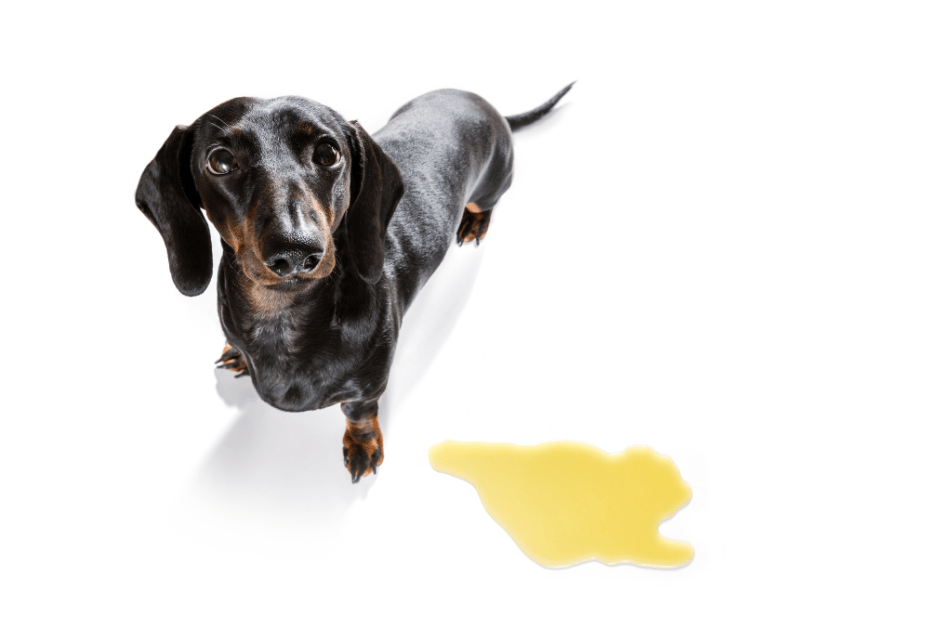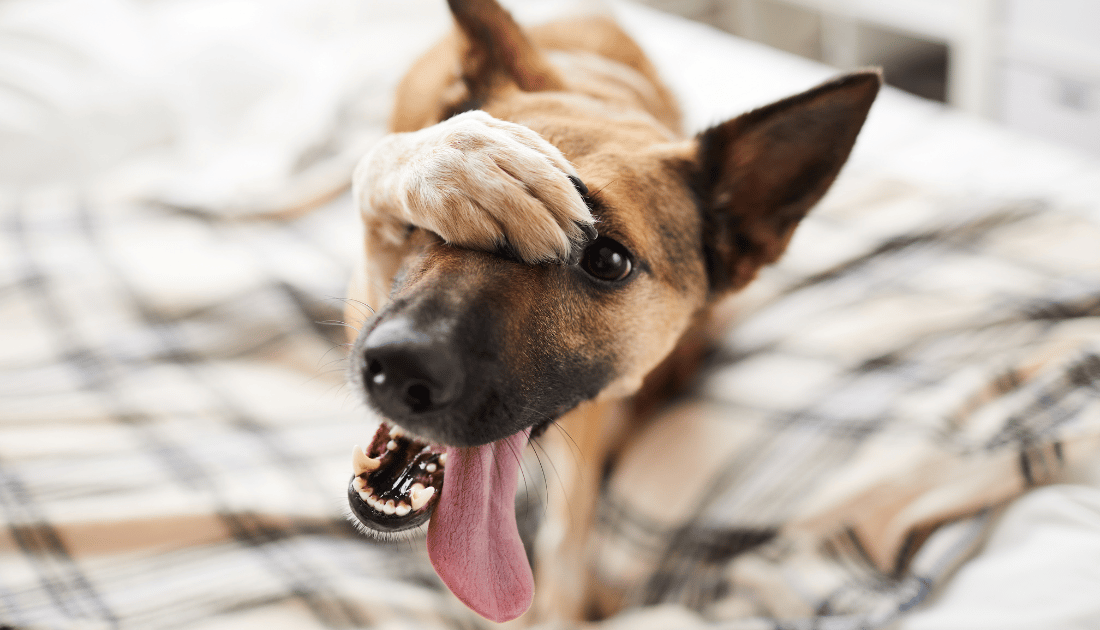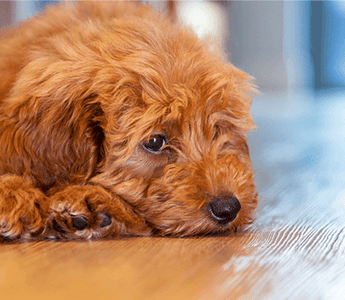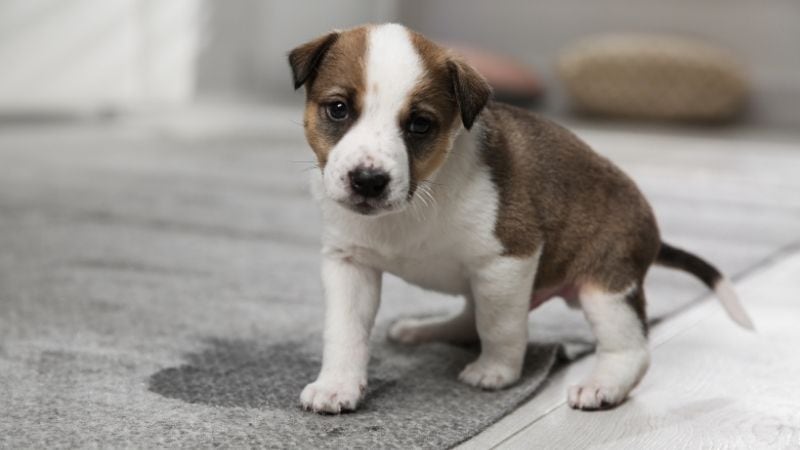Have you ever come home to find your dog has suddenly peed on your bed? It’s confusing, frustrating, and maybe even a little upsetting.
You might be wondering, “Why did my dog do this out of nowhere? ” Understanding the reasons behind this behavior can help you fix the problem quickly and keep your bond strong. You’ll discover the surprising causes behind your dog’s unexpected accident and learn simple steps to prevent it from happening again.
Keep reading—your bed (and your peace of mind) will thank you.
Common Causes Of Bed Wetting
Finding your dog has peed on your bed can be frustrating and confusing. Understanding the common causes of bed wetting helps you address the issue effectively. It’s important to consider various factors that might be influencing your dog’s behavior.
Medical Issues
Health problems are often the first cause to rule out. Urinary tract infections, bladder stones, or kidney disease can make it difficult for your dog to control urination. Even diabetes or hormonal imbalances might lead to sudden accidents.
If your dog’s peeing on the bed is new and unexpected, a vet visit is essential. Ignoring medical causes can worsen your dog’s condition and prolong the problem.
Behavioral Factors
Sometimes, your dog’s actions reflect stress or anxiety rather than physical problems. Changes in routine, new family members, or loud noises may trigger this behavior. Dogs may also mark territory or seek attention through bed wetting.
Think about recent changes around your home. Has your dog been left alone more often? Addressing anxiety with extra playtime or training could reduce accidents.
Environmental Triggers
Your dog’s surroundings also play a big role. A new bed, different sleeping area, or unfamiliar smells on your bedding might confuse them. Sometimes, a lack of proper bathroom access or a disrupted schedule causes accidents.
Check if your dog’s regular bathroom spot is accessible and clean. Could a change in weather or outdoor conditions be keeping them indoors longer than usual?

Credit: rockykanaka.com
Health Problems To Watch For
Unexpected accidents on your bed can be frustrating, but sometimes your dog’s sudden behavior signals a deeper health issue. If your dog has started peeing on your bed out of the blue, it’s important to consider possible health problems. These conditions often cause discomfort or urgency, making it hard for your dog to hold it in.
Urinary Tract Infections
Urinary tract infections (UTIs) are one of the most common causes of sudden urination accidents. They cause pain and frequent urges, so your dog might not make it outside in time. You might notice your dog licking their private area more or showing signs of discomfort when peeing.
If your dog’s behavior seems off, a quick vet visit for a urine test can confirm if a UTI is the culprit. Treating the infection usually solves the problem fast, preventing ongoing accidents and discomfort.
Bladder Stones
Bladder stones are another health problem that can lead to random peeing episodes. These stones irritate the bladder lining, causing pain and urgency. Your dog might strain to urinate or produce only small amounts at a time.
Noticing blood in the urine or frequent attempts to pee with little output are red flags. Bladder stones require veterinary diagnosis and sometimes surgery or special diets to clear.
Kidney Disease
Kidney disease affects your dog’s ability to regulate fluids and waste. This can lead to increased urination, including accidents on your bed. You may also see signs like increased thirst, lethargy, or weight loss.
If your dog suddenly pees in unusual places and drinks more water, ask your vet to check kidney function. Early diagnosis can help manage the disease and improve your dog’s quality of life.
Behavioral Reasons Behind The Accident
Understanding why your dog peed on your bed involves looking at their behavior. Dogs use urination to communicate many things. Sometimes, accidents are not about health but feelings and habits. These behavioral reasons help explain the sudden bed-wetting.
Marking Territory
Dogs mark places to show ownership. This act sends signals to other animals. Your bed has your scent, so your dog may add theirs. Marking helps your dog feel secure in their space. It is more common in unneutered dogs but can happen to all.
Anxiety And Stress
Stress can make dogs lose control of their bladder. Changes like moving, new pets, or loud noises trigger anxiety. Your bed may smell like you and feel safe. Urinating there is a way to calm down. Watch for other signs of stress like pacing or whining.
Seeking Attention
Dogs learn that accidents get your focus quickly. If your dog feels ignored, peeing on the bed is a loud call. Even negative attention is better than none for some dogs. This behavior shows a need for more play or affection. React calmly to avoid encouraging this habit.

Credit: rockykanaka.com
How Changes In Environment Affect Your Dog
Changes in your dog’s environment can trigger unexpected behaviors like peeing on your bed. Dogs rely heavily on routine and familiarity to feel secure. When their surroundings shift, even slightly, it can cause stress or confusion that leads to accidents.
New Household Members
Bringing a new person or pet into your home can disrupt your dog’s sense of security. Your dog might pee on your bed to mark territory or express anxiety about the newcomer. Have you noticed your dog acting more clingy or withdrawn since the change?
Try giving your dog extra attention and reassurance during this transition. Gradually introduce new members and maintain your dog’s usual routine to help them adjust.
Altered Routine
Dogs thrive on consistency. Changes like different feeding times, walks, or even your work schedule can confuse your pet. This confusion sometimes leads to accidents, including urinating in unusual places like your bed.
Observe if recent shifts in your daily life coincide with your dog’s behavior. Reestablishing a predictable routine can help your dog regain comfort and control.
Unfamiliar Surroundings
Moving to a new home or spending time in a strange place can overwhelm your dog. They may pee on your bed as a way to claim a safe spot in unfamiliar territory. This behavior can also be a sign of stress or insecurity.
To ease this, bring familiar items like your dog’s bed or toys to new locations. Creating a cozy, recognizable space helps your dog settle and feel more confident.
Preventing Future Incidents
Preventing your dog from peeing on the bed again needs patience and care. Understanding the cause helps to stop future accidents. Focus on training, health, and comfort to keep your dog happy and your bed dry.
Proper Training Techniques
Teach your dog where to pee using clear commands. Praise your dog after peeing outside or on the pad. Use consistent schedules for bathroom breaks. Clean accidents with enzyme cleaners to remove smells. Avoid punishment; it may cause fear and confusion. Reward good behavior to encourage learning.
Regular Vet Check-ups
Health issues can cause sudden peeing problems. Urinary tract infections and bladder issues are common causes. Schedule regular vet visits to catch problems early. Discuss any changes in behavior with your vet. Follow vet advice for treatment and care. Healthy dogs have fewer accidents.
Creating A Comfortable Space
Dogs need a safe, calm place to relax. Provide a cozy bed away from noise and distractions. Keep the sleeping area clean and dry. Use calming scents or soft blankets to help your dog feel secure. A comfortable space reduces anxiety and stress. Less stress means fewer accidents.
Cleaning And Managing The Mess
Cleaning and managing the mess after your dog pees on your bed is crucial. Quick action helps remove stains and odors. It also reduces the chance of your dog peeing again in the same spot. Proper cleaning keeps your bedding fresh and your home smelling clean.
Effective Cleaning Methods
Start by removing all bedding and washing it in hot water. Use a strong detergent to break down urine stains. Blot the wet area with paper towels or a clean cloth. Avoid rubbing to prevent spreading the stain further.
For mattresses, sprinkle baking soda over the wet spot. Let it sit for 15 to 30 minutes to absorb moisture and odor. Vacuum the baking soda thoroughly afterward. This helps freshen the mattress naturally.
Using Enzyme Cleaners
Enzyme cleaners break down the proteins in urine that cause odors. They are very effective for pet stains. Spray the cleaner generously on the affected area. Allow it to sit for at least 10 minutes or follow package instructions. This process removes smells that attract dogs to pee again.
Choose products labeled safe for fabrics and pets. Test a small area first to avoid damage. Enzyme cleaners work well on bedding, mattresses, and carpets.
Preventing Repeat Accidents
Keep your dog’s bathroom area clean and accessible. Offer frequent bathroom breaks, especially before bedtime. Use a waterproof mattress cover to protect your bed. This makes cleanup easier if accidents happen again.
Reward your dog for peeing outside. Avoid punishment, which can cause anxiety and more accidents. Consistent training and positive reinforcement help reduce random bed peeing over time.

Credit: bullybeds.com
Frequently Asked Questions
Why Does My Dog Pee On The Bed Suddenly?
Dogs may pee on the bed due to stress, anxiety, or a medical issue. Changes in routine or environment can trigger this behavior. It’s important to rule out infections and consult a vet for proper diagnosis and treatment.
Can Health Problems Cause Dogs To Pee Indoors?
Yes, urinary tract infections, bladder stones, or kidney issues can cause indoor accidents. These conditions increase urgency and frequency of urination. Always consult a veterinarian to check for health problems if your dog pees unexpectedly.
How Can I Stop My Dog From Peeing On My Bed?
Identify the cause first, such as anxiety or health issues. Use positive reinforcement for proper bathroom habits. Clean the bed thoroughly to remove odors and avoid punishment, which can worsen behavior.
Is My Dog Marking Territory By Peeing On My Bed?
Sometimes, dogs mark territory by urinating indoors. This is common in unneutered males or stressed dogs. Behavioral training and neutering can reduce marking behavior. Consult a vet or trainer for advice.
Conclusion
Understanding why your dog peed on the bed helps prevent future accidents. Observe changes in their behavior. Stress, health issues, or territorial instincts might be reasons. Consult a vet for persistent problems. Training can also address this issue. Consistency is key in reinforcing good habits.
Ensure your dog feels secure and comfortable at home. A clean, safe space encourages good behavior. Patience and understanding go a long way. Your dog relies on you for guidance. Create a loving environment and strengthen your bond. A little effort now can lead to fewer messes later.

